
How to Get Hold of Rich, Accurate UK Business Data
Simone Autiero, 27 October 2023
The UK government provides two commonly-used, albeit limited, sources of UK business data. One is the Companies House listings—the business registry to which UK-based companies are obliged to submit basic information. The other is the Office for National Statistics (ONS)—an aggregator of data on UK business and society.
These can be useful resources (and actually, the UK is ahead of other countries in making this data accessible), but they come with significant drawbacks:
- They’re not always completely up-to-date. ONS publishes bulletins on business activity, size, and location at intervals throughout the year. Meanwhile, businesses have nine months to submit their annual accounts to Companies House. This means there’s often a lag between changes in a business ecosystem and the data you see.
- They don’t give a fully accurate picture of the business landscape. A lot can change between the ONS’s sporadic publications. Plus, Companies House is explicit about the fact that it “does not verify the accuracy of information filed” by businesses.
- These platforms are not easy to use. The ONS publishes certain graphs and visualisations, but you’ll need to download a CSV file to dig into the data beyond that. And many users find the Companies House search function to be pretty tough to navigate. For example, you can only search industries by Standard Industrial Categorisation (SIC) codes, which haven’t been updated since back in 2003.
- There are limits to the data you’ll see. The ONS provides a general overview of key statistics and trends, such as overall business population estimates. Meanwhile, Companies House only features data on legal entities—not actually operating companies—and it lacks information about key people, operating locations, and more.
In summary, this means that if you’re looking for really specific data on particular industries in particular areas, it’s difficult to find the information you need (e.g. startups in Manchester, or robotics companies in Oxfordshire). Plus, when you don’t know if your data is accurate, it’s a huge drain on time and resources to sort through and verify the information.
Luckily, there’s a much easier way to find accurate and up-to-date UK business data with Beauhurst. Our platforms have rich, verified data on every active private company in the UK.
In this guide, we show you how you can use Beauhurst to:
- Access up-to-date UK business data by region, industry, and more
- Search for individual companies using highly specific criteria
- Be the first to hear about changes in the business landscape
- Find information on influential individuals and more
You can access Beauhurst data through our platforms designed specifically for universities and governments, financial and professional services, investors, and sales teams. Read on to find out more or book a demo now to see how Beauhurst works for you.
How to benefit from rich UK business data with Beauhurst
Beauhurst’s business database has an unmatched breadth of data. Our dataset contains information on nearly 13m past and present UK companies, plus 20m key individuals operating across the business landscape in Britain.
We take that information from a wide range of sources, including census, HMRC, and patent data, third-party data sources, the media, Companies House, and much more. Our team of 60+ data analysts—supported by AI and machine learning technology—personally clean up, standardise, verify, and enrich our data.
1. Access up-to-date business data by region, industry, and more
With Beauhurst, you can access a detailed picture of businesses operating in particular regions or industries across the country. While you could theoretically do that through ONS reports, Beauhurst provides much more up-to-date information a lot more easily.
Through our platforms, you can see the current picture of any given business ecosystem, including breakdowns of business growth rates, information on the labour market, and aggregated data on different sectors—plus a lot more.
Let’s take one example to illustrate this:
If you want to see businesses specifically in Milton Keynes, simply search for that locality through Beauhurst.
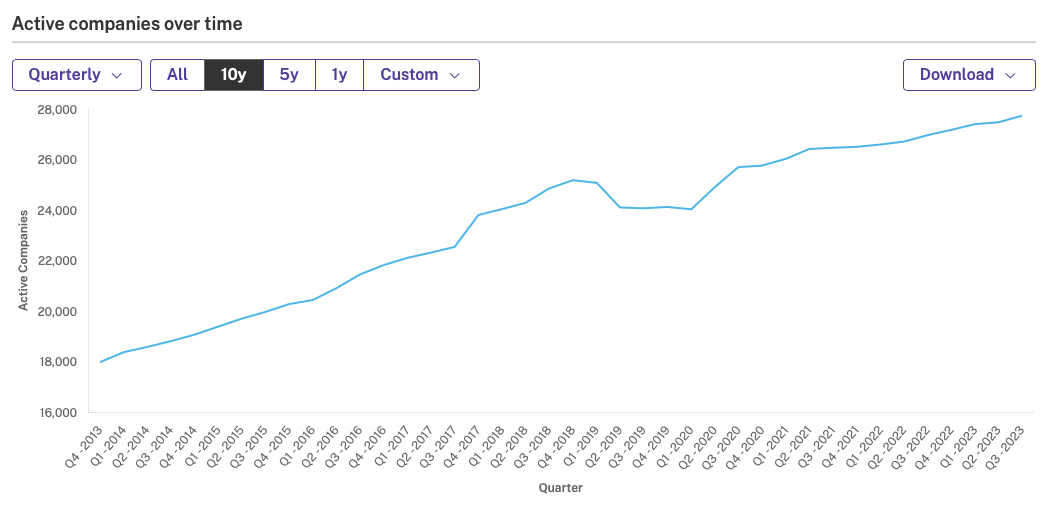
Through your search, you’ll be served graphs like the above, which shows the growth of active companies in Milton Keynes over time. But you can dig much deeper to find:
- The number of new businesses and those that have ceased business
- A breakdown of the industries in which they operate, and whether they’re small or established businesses
- An overview of businesses by stages of evolution
- Employment figures, executive pay, and job statistics, including directorships by gender
- Local business news
All this information will be shown through clear visualisations to help you easily get a sense of business activity.
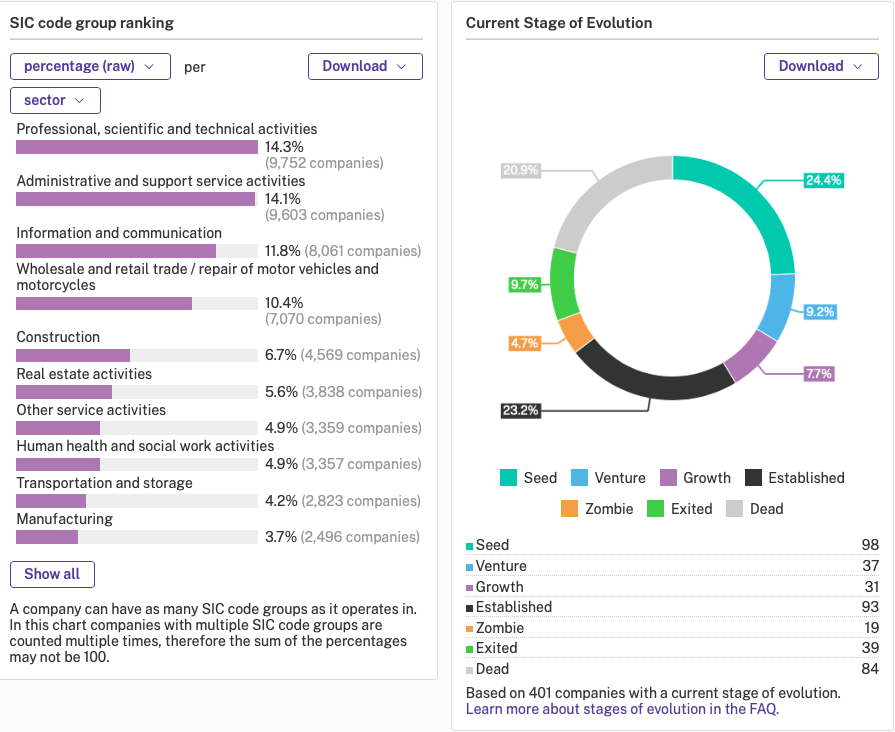
You can then filter this data even further.
Let’s say you want to focus on companies in Milton Keynes that are startups or at the growth stage. Refine your search to only include seed, venture, or growth companies and you’ll be served data that’s relevant to these particular businesses.
For instance, you can see which specific companies in the area have raised funds and arrange them in your dashboard by how much they’ve raised. This can be crucial information if you’re a local authority looking to support high-growth companies in your area.
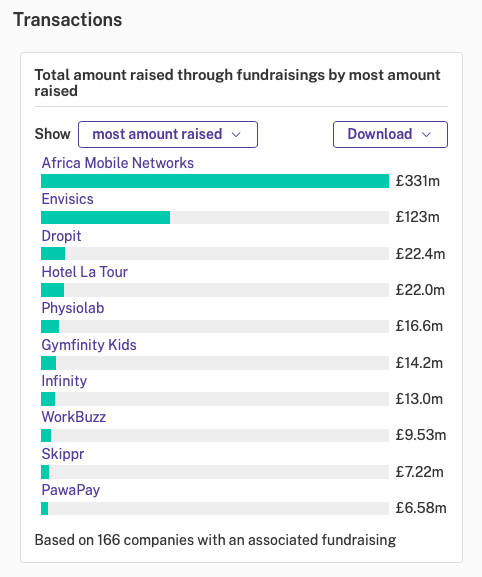
There are many other ways that investors, local authorities, universities, and other organisations can use this data, from any region across England, Scotland, Wales, and Northern Ireland. For example, the London-based stock broker, finnCap, uses Beauhurst to research industry trends, identify ambitious companies, and prepare for meetings. The team uses Beauhurst every day, and our data is helping them bring in new business.
“The depth and accuracy of data that Beauhurst collects is game changing,” says finnCap’s Associate Director, Hugo Lough. “It allows us to be more efficient and access a wider pool of potential clients, which in turn results in more revenue for the business.”
2. Search for individual companies by highly-specific criteria
From the big picture of what’s happening in given regions or industries, you can drill down into Beauhurst’s data to find information on specific UK companies.
Rather than sifting through hundreds of businesses on Companies House lists, Beauhurst’s Advanced Search functionality lets you quickly identify businesses that match specific, overlapping criteria. It’s a tool that universities use to find opportunities for Knowledge Transfer Partnerships, and something investors use to identify companies to invest in.
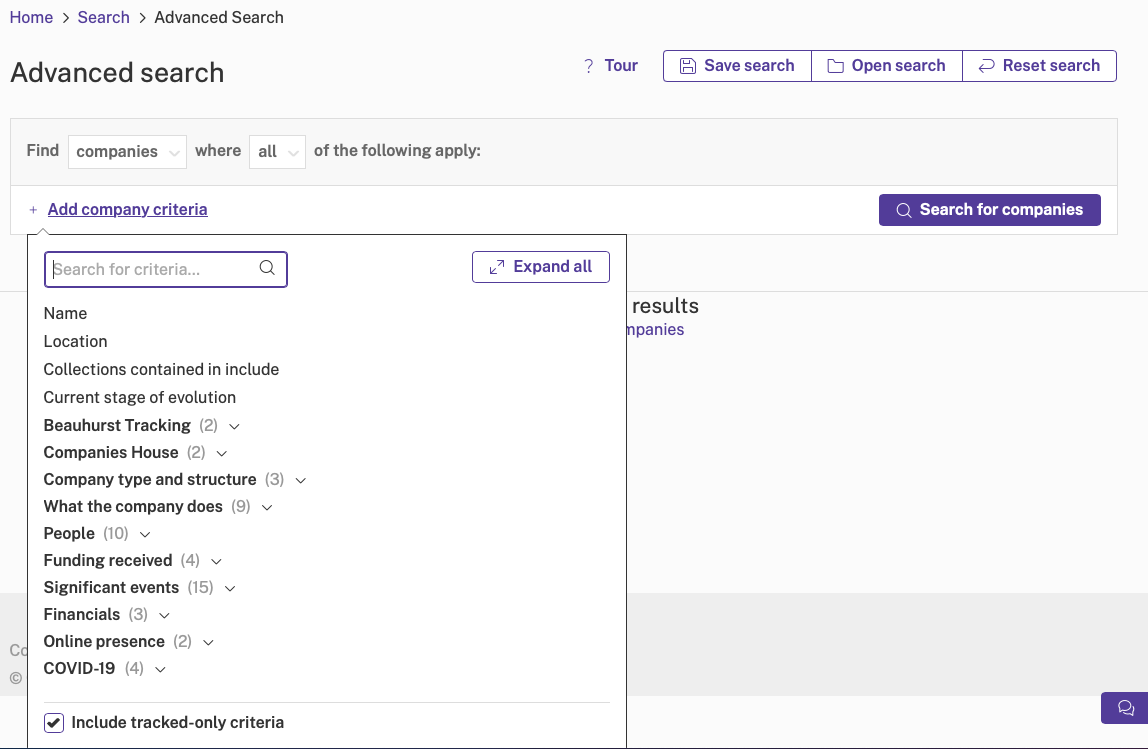
As the image above shows, there are many criteria you can search with:
- Location. As we saw above, you can search for companies that are relevant to a local area. Specifically, you can receive results by business’s operating headquarters, rather than registered addresses, so you can see where companies actually operate.
- Industry. Beauhurst lets you search for companies by buzzwords such as “fintech” or “robotics”, target markets, and commodity trade activity, as well as SIC codes.
- Significant events. Limit your query to companies that are university spinouts or that have had successful fundraising rounds, or search for the impact that the coronavirus pandemic had.
- Financial information. For instance, search for companies with a revenue above a certain amount.
- People. You can identify key players, including directors, owners, or influencers.
- Much more. Find out more about the types of data we have here.
Then you can overlap all this data to perform more specific searches. As an example, you can look for university spinouts in Edinburgh that have received funding over £1m.
This search immediately returns 31 results, meaning you don’t have to trawl through data lists and business profiles to find them yourself.
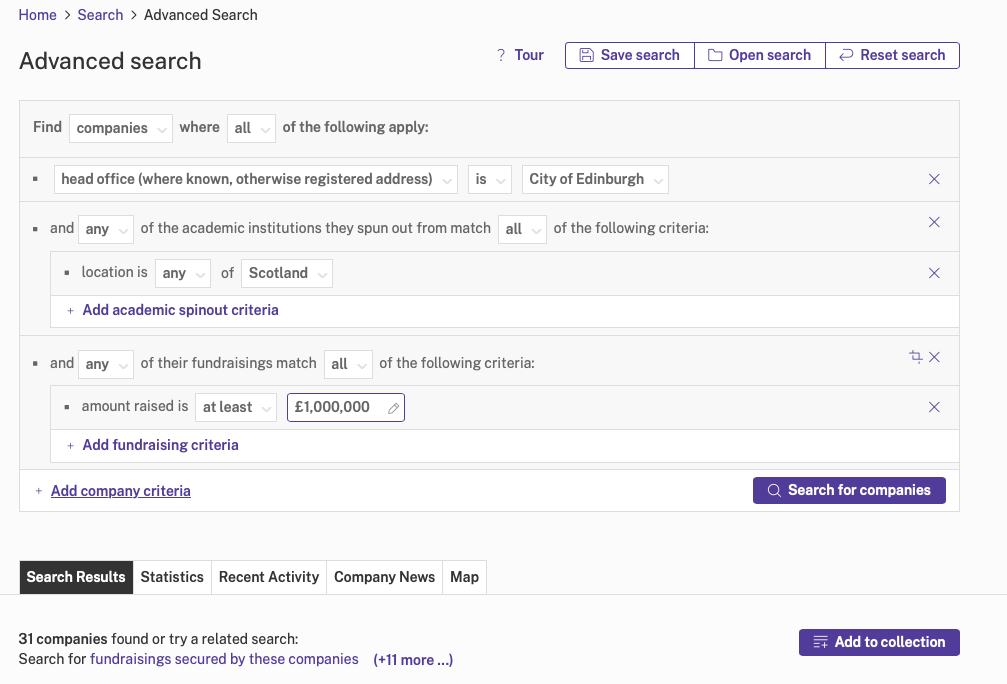
One organisation that benefits from Beauhurst’s Advanced Search tool is the Science and Technology Facilities Council (STFC). The STFC leverages our data to identify early-stage space tech startups, which it supports to innovate and scale.
“The ability to create very specific custom searches on almost any company characteristic lets me target businesses with a really high level of granularity,” says Sue O’Hare, Operations Manager at the STFC.
“I love the feeling of having information at my fingertips and the knowledge that I can get what I need. If you need timely and comprehensive information about early-stage high-tech startups, you should be looking at Beauhurst.”
3. Be the first to hear about changes in the business landscape
If you’re using Companies House or the ONS to access UK business data, it’s easy to miss if something changes in your business ecosystem.
To make sure you’re staying on top of live developments, you’ll often want to compare current datasets and company profiles with historical information and data from the previous year. This takes a lot of time, especially as the data might be collected differently or presented in different formats across different time periods.
What sets Beauhurst apart is that our platform will regularly update you on the information that matters to you most. Simply search for the information you want—by companies or region, as you’ve seen above—and then save that search into your “My Collections” tab.
With that search saved, you’ll get regular notifications when new information is added to that dataset. This way, you’ll be the first to know about any changes to the business environment, such as if new companies have emerged or if a business has received funding.
If you save that search we conducted above (university spinouts in Edinburgh) in your “My Collections”, for example, you’ll receive a live stream of news and updates like this:
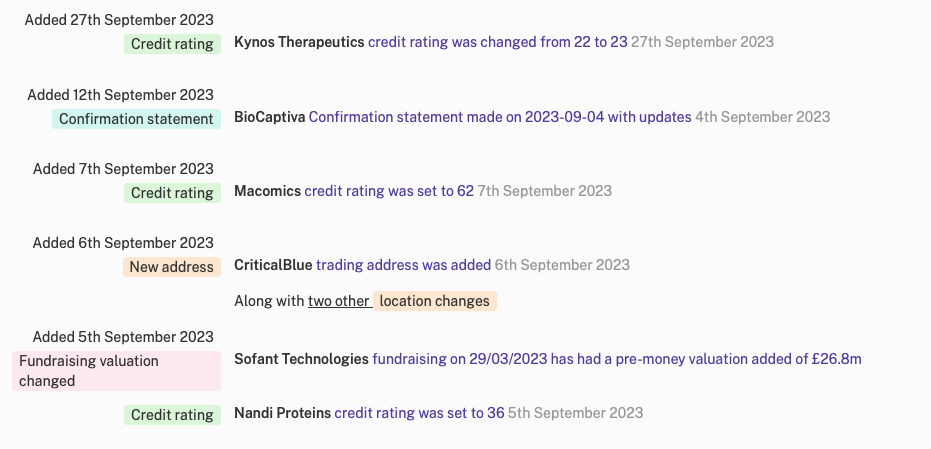
Of course, some of those updates may not be directly relevant to your business needs. That’s why you can easily select and filter the types of events you want to be informed about, as well as the frequency with which you receive notifications. For example, you can get alerts on new fundraising rounds, or if a new key decision maker has joined the company.
Plus, you can choose to receive these notifications daily, weekly, or at a different cadence.
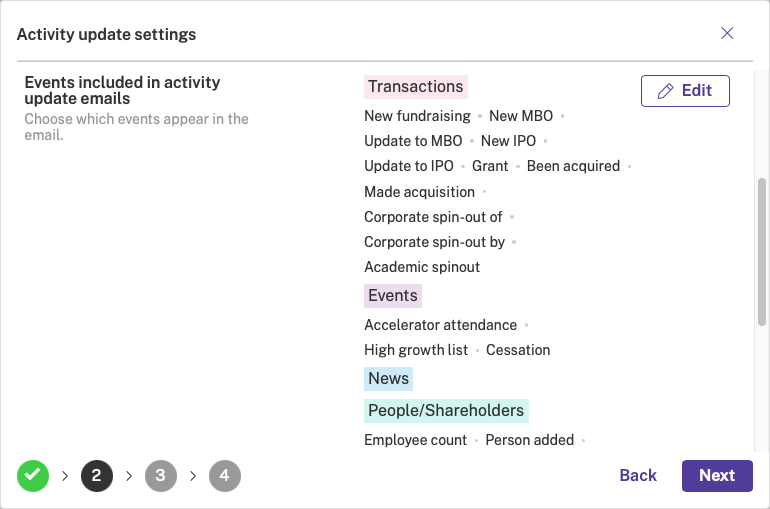
This way Beauhurst saves you the time and labour of staying up to date on your business ecosystem—and ensures you don’t miss a thing.
As one example, the Lancashire County Council uses Beauhurst’s “My Collections” feature to track specific businesses in the local area.
“Rather than searching across specific criteria on Beauhurst on a regular basis, I have Collections set up based on my key drivers,” Amin Vepari, Business Finance and Scaleup Lead, explains. “This means I can get weekly updates on relevant businesses, [which] allows us to be more proactive and ahead of the curve.”
“With Beauhurst, we have access to real-time information, with a level of detail that we wouldn’t get anywhere else. And it’s very, very easy to use.”
4. See data on influential individuals and more
Beauhurst has an unmatched breadth of data on 20m key individuals in business, such as directors, investors, and more. With this information, your organisation can quickly discover the people that matter in a particular industry, region, or company—as well as any shared networks you’re in.
Just like with Beauhurst’s business search, you can search for individuals through a wide variety of different criteria:
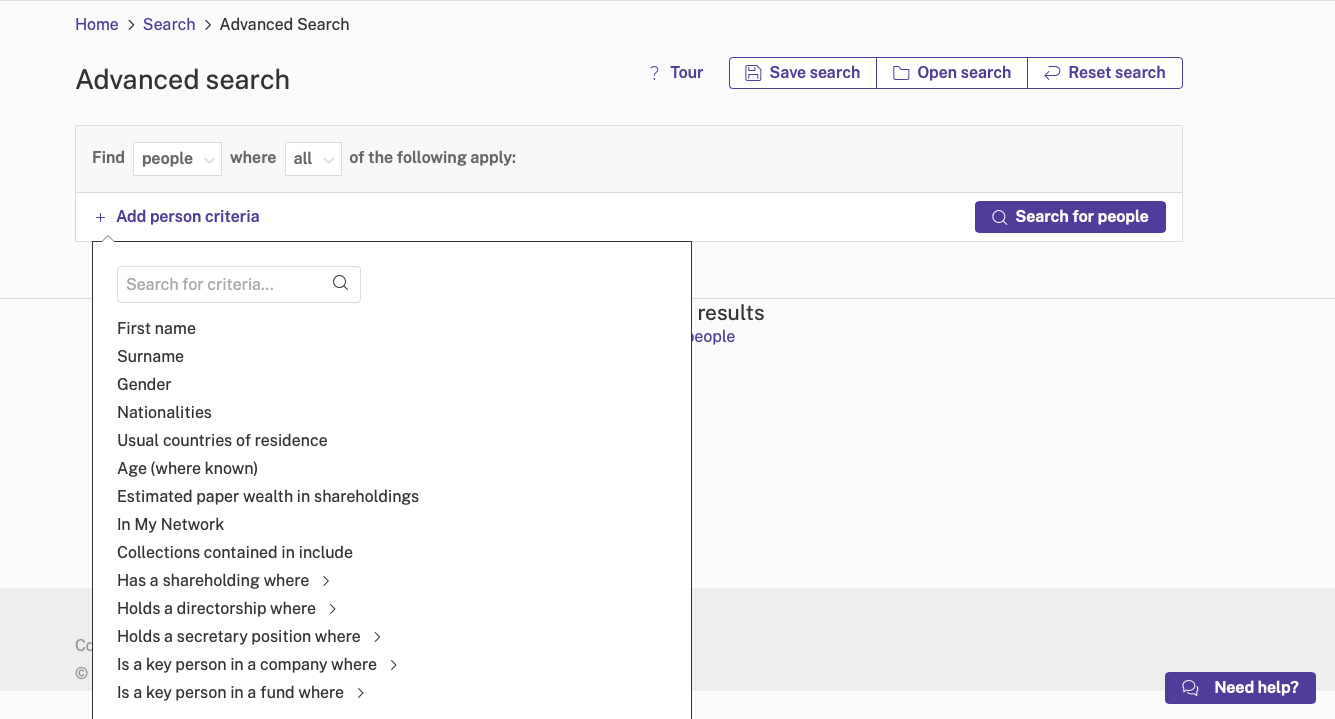
For example, you could be looking for women directors of AI companies in London. Then, you can refine that search further, by company turnover, by whether they’re in your network, or another criteria. Then, you can click through to their personal profile, where you can find information including:
- Their past and present job roles
- The shares they own or investments they’ve made
- Whether they’re a key person in a company or fund
- Their contact details, including phone numbers, email addresses, and social media profiles
- Whether they’re in your network, by first- or second-degree relation

Universities often use this tool to invite speakers to events or to track their alumni. And there are many ways other organisations can use it, too. For example, Bailey Fisher Executive Search uses Beauhurst in their work of helping businesses recruit exceptional talent.
“[When engaging with a business,] we have to understand the key investors—that’s everything from angel investors to the shareholding split. This information allows us to understand the influential parties with any particular business, and make sure that we are engaged with the right individuals within that organisation,” Toby Young from Bailey Fisher explains.
“When we’re talking with clients, we can say that we’ve been through the entirety of [the market] and these are the top 6/7 candidates that we think are applicable to this particular search.”
For Toby, Beauhurst does things better than any other platform could. “Beauhurst is the leading platform in the UK […] It’s just been a very easy tool to use and a great asset to our business. Beauhurst is just much quicker, more accurate and intuitive than other tools we’ve tried.”
Access the deepest UK business data with Beauhurst
Beauhurst has the most comprehensive, up-to-date, and accurate database on UK companies available. And thanks to our team of data analysts who have stitched all this information together into clean and comparable company profiles, it’s also the easiest to use.
As we’ve explored in this guide, a range of organisations use Beauhurst to follow live business trends, dig down into specific companies, find out about key individuals operating in industry networks, and more.
To find out how Beauhurst’s UK business data can work for you, book a demo with us.
Grow your business.
Get access to unrivalled data on all the companies you need to know about, so you can approach the right leads, at the right time.
Book a demo today to see all of the key features of our platforms, as well as the depth and breadth of data available.
An associate will work with you to build a sophisticated search, returning a dynamic list of organisations that match your ideal customer profile.
Beauhurst Privacy Policy